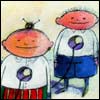You shall not see your brother's ox or sheep going astray and ignore them; rather, you should restore them to your brother…
And so you shall do with every lost thing of your brother - you may not remain oblivious (22:1-3)
When Rabbi DovBer of Lubavitch was a young man, he lived in the same house as his father, Rabbi Schneur Zalman. Rabbi DovBer and his family lived in the ground floor apartment, and Rabbi Schneur Zalman lived on the second floor.
One night, while Rabbi DovBer was deeply engrossed in his studies, his youngest child fell out of his cradle. Rabbi DovBer heard nothing. But Rabbi Schneur Zalman, who was also immersed in study in his room on the second floor, heard the infant's cries. The Rebbe came downstairs, lifted the infant from the floor, soothed his tears, replaced him in the cradle, and rocked him to sleep. Rabbi DovBer remained oblivious throughout it all.
Later, Rabbi Schneur Zalman admonished his son: "No matter how lofty your involvements, you must never fail to hear the cry of a child."
The Lubavitcher Rebbe told this story to a gathering of community activists in 1962. "To me," said the Rebbe, "this story characterizes the approach of Chabad-Lubavitch. With all the emphasis on self-refinement and one's personal service of the Almighty, one must always hear the cry of a child.
"This is most applicable today, when so many Jewish children of all ages, have fallen out of the cradle of their heritage. Their souls cry out to us, and we must have the sensitivity to hear their cries and to respond. We must interrupt our prayers and our studies and do everything in our power to sooth these desperate souls and restore them to their cradle."







Join the Discussion